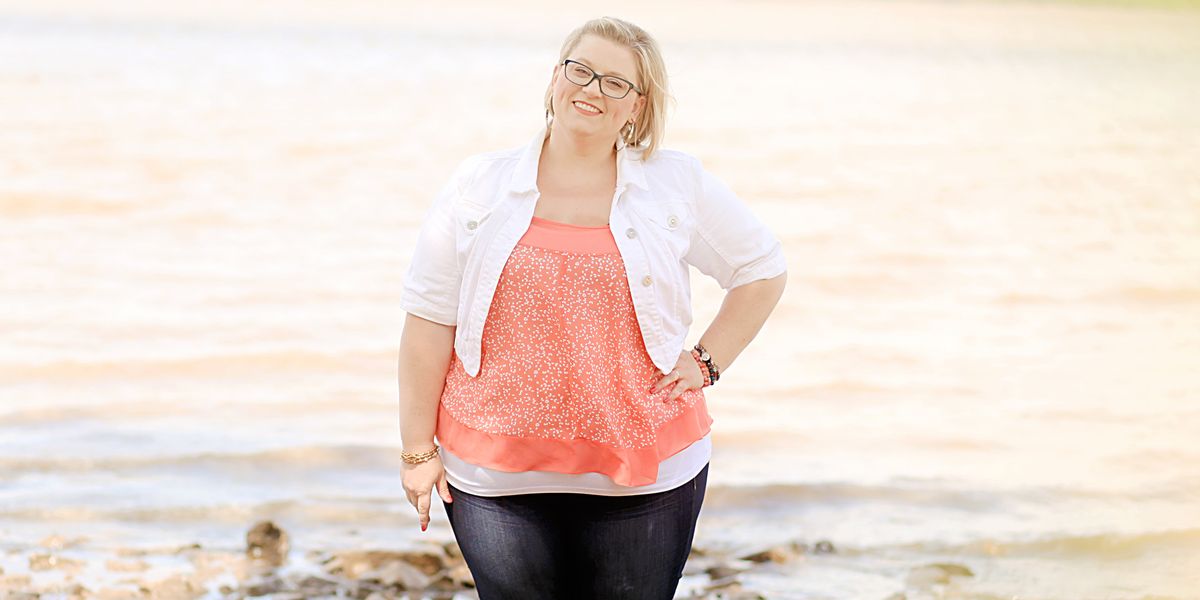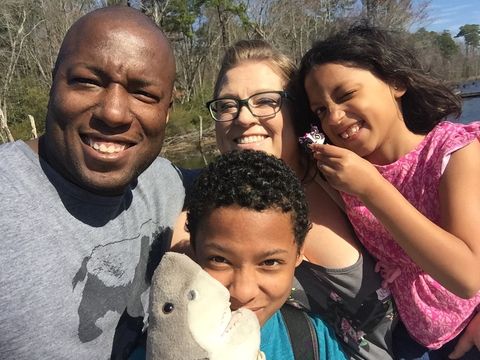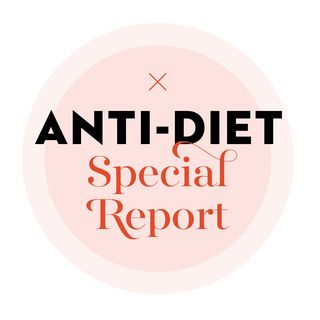The first time I came across the fat acceptance movement was in 2008, when I was five months pregnant with my daughter. I was afraid of passing down my weight-loss obsession to my child, and I spent my evenings on the Internet looking up phrases such as “fat and healthy weight loss” and “fat exercise”— trying to find something that would teach me to make peace with my size. I eventually landed on fat activist Marilyn Wann’s website, FAT!SO? When I first read her explain how you could eat delicious food and be fat but still be healthy, it seemed too good to be true: Up until that point, I didn’t realize it was an option to live in my body as it is; to be worthy of eating, moving and enjoying my life without losing weight.
I bought Wann’s book, FAT!SO?: Because You Don’t Have to Apologize for Your Size, and loved it. I wanted to share her ideas with my doctors, friends and family. But I learned very quickly that the rest of the world wasn’t as open to the concept of body acceptance.
In fact, when I mentioned the book at my next prenatal visit, my doctor told me Wann was “glorifying obesity” and recommended I look into LapBand surgery after I gave birth. After all, it had been recently approved by my insurance carrier and if I didn’t get the weight off I would surely die. In fact, I had been told by doctors since my early 20s that if I didn’t lose weight I would become diabetic at best (even though my blood work never showed this risk), and I wouldn’t live more than another decade at worst. Well, I’ve made it to 42 so far — and I don’t have diabetes.
My history of yo-yo dieting
I started my first diet when I was just 10 years old and centered my life around weight loss for decades. As I grew into my 20s and 30s, my weight went up and down — I would lose 40 to 50 pounds at a time and then gain it all back.
My feelings about fat acceptance would cycle, too. I craved the peace I thought I saw within the body positive movement. I wanted to be okay with my body and not treat it like something that needed to be fixed. I would immerse myself in affirmations of self-love, load my social feed with body-positive influencers, nourish my body with nutrient-dense meals and try to use exercise as a way to care for my body, not punish it. I would work on eating intuitively. But, inevitably, I would regain a large amount of weight, freak out and prepare to hop on another diet.
I completed this cycle over and over until I had my last big weight loss, about 10 years ago. It was a monumental effort that I treated like a full-time job. My spouse, who was in the Air Force, was getting ready to deploy, so I was able to clean out all his high-calorie foods and alcohol. I asked my doctor for a referral to a dietitian and exercise physiologist. I turned all my attention to food, exercise and caring for my two young children. I weighed and measured everything that went into my mouth and exercised two hours a day. I recruited other women to lose weight with me so that we would have a support group.
My whole life centered around my weight loss. Everything. In eight months, I lost 100 pounds. I had loose skin and flour sacks for boobs, but still, it felt amazing! I was able to fit comfortably in plane seats and was unafraid to fly. I felt respected and seen — when I said something, people actually listened. It’s like I could live in this world and not be ashamed of who I was, not have to justify my existence or apologize for the space I occupied.
But soon after my spouse came home from being deployed, he received orders for us to relocate. I was devastated. I knew the only way I would be able to maintain my weight loss was with the support I had from my doctors and friends. As soon as the plane landed at our new location, I started eating foods that were not on my plan. I loved where we lived before, and our new town was not a good fit for me. It was hard making friends, and rather than putting in the effort to do meal prep, I started relying on restaurants. I tried to get back on track, but there was no way to re-establish my routine. I gained all the weight back in less than a year.
Three years after we moved, my spouse retired from the military and we moved to another location. By then, I was deep into the body-positive movement, eating food I enjoyed and barely exercising. But I was worried about how my weight would affect me as I got older. My blood pressure was slowly creeping up and I did not want to be on medication. It’s bad enough to be fat in a doctor’s office — studies have found that many health professionals view overweight patients and lazy and noncompliant — but if were fat and on medication, I knew I would be treated even worse.
When a medical professional tells me I’m obese, or begins to lecture me on how to eat, I feel like all the confidence and strength I have as a woman and a mother disappears and I shut down. I feel ashamed and wonder, Why can’t I eat less, exercise more and not use food as a way to deal with stress?
On the flip side, though, I also wonder, Why does this even matter? Why can’t I exist as is without everyone commenting on my body? Does my weight determine my morality, my intelligence, my creativity? My spouse is very attractive, and many women tell me how “hot” he is. Every time they say this, it feels like they’re really telling me that I’m lucky he married me and he hasn’t cheated on me, and that I should thank my lucky stars that he tolerates my fatness.
Still caught between two worlds
As much as I agree with the body-positive movement in theory, I find that as I get older and my blood pressure is rising, it’s simply not working with my reality. I love the idea of enjoying food and using exercise as a way to care for myself, but the desire to lose weight is real, and it’s not going away. For decades, I have worshiped at the altar of thinness. I have focused on sweating, cutting calories and saying no to outings with friends for fear of cheating on my diet. That desire to be thin has pushed me to extreme, unsustainable behavior.
But the other side of this can be just as extreme. Weight loss is all I and so many other women have known for years, yet so many people I’ve communicated with in the body-positive movement make it clear to me that we are not supposed to talk about weight loss at all. But by not talking about the monster under the bed, we give that monster more power, and I wind up feeling even more anxiety.
When I once posted on a body-positive Facebook group, asking how people were dealing with the pressure to lose weight, I was immediately made to feel bad. I was told I should just tell people to not talk to me about their diet, cleanse my social media and find a doctor who practices Health at Every Size (a philosophy that respects differences in body types and focuses on health rather than weight loss). I was told that if I really loved myself, I wouldn’t be asking that question and I wouldn’t care what anyone thinks of my body. I would wear bikinis and feel no shame.
And this is where I knew that the body positivity movement, or at least the one I had found online, wasn’t something I’d be good at. I knew that me loving myself didn’t look like wearing a bikini, or telling people to stop talking about diets or fighting with medical professionals. Self-love to me, is being okay with my desire to diet, with my desire to not diet, with me being a conflicted human being and wanting to figure out why I am the way I am.
Also, I couldn’t help but notice that so many of the dietitians pushing intuitive eating are thin, white women. How can a thin person tell me to stop dieting? How can they understand what my life is like? Do they understand how I’m treated by doctors who are supposed to be helping me? Or that when I’m grocery shopping, people will comment on what’s in my cart? Or that passersby will fling derogatory terms at me as they’re driving by? I am larger than life yet invisible at the same time. People notice when I walk in the room but want nothing to do with me, because obviously if I knew how fat I was, I would do something about it.
When I’m thinner, I am treated so much better. I am respected, even though I am still the same person! So do I choose a life where weight loss/maintenance consumes 80% of my life, or do a choose a life of growth, creativity, loving and enjoying my family, celebrating life with delicious home-cooked meals, and stimulating conversations? I am treated better when I’m thinner, but I live more authentically when I’m fat. It’s exhausting. I still crave that approval from society, but as I’ve gotten older I realize I just don’t have enough gas in my tank to focus on it. I need to use the energy I have to care for my children and my marriage, to work, be creative and rest. I am unwilling to relinquish all of that to try and make my body more appealing to society.
Finding a middle ground
During the pandemic, rather than continuing to think about my body, I decided to explore other interests. I started gardening, dabbling in hydroponics, podcasting and even woodworking. I didn’t have the time or energy to explore any of these things when I was dieting or involved with the body-positive movement. I also found a HAES-focused doctor, who told me she doesn’t care what the scale says and doesn’t blame every physical issue on my size — but she does want to hear about my own feelings about my weight. I feel like I’ve finally found a doctor who sees me as worthy of good medical care.
I still don’t know how I feel about dieting or the body positive movement. I feel like there is value in both camps. Weight stigma is terrible and should be eradicated, and I think the push to normalize different body shapes and sizes is also important. However, I don’t think we should avoid talking about the fact that some of us do have a desire to change our bodies. I think it’s normal to want to have other people think you look good. I want to be thin (and therefore celebrated by society), rich and have mad woodworking skills. But the truth is I will most likely always be a large middle-class woman who will be working toward making peace with decades of fat hate. I may go on another diet, I may be disgusted with my body during vulnerable moments, I may be totally okay with my body in other moments.
I’m not going to pretend I don’t desire to be a smaller size and blend into society from time to time. I’m also not going to beat my body into weight-loss submission. Both sides of this issue feel stifling to me. We can’t simply sweep the intense weight-focused beliefs our society has held for decades under the rug. By not talking about the desire to change our bodies, its as if the body-positive movement is in a state of denial about how toxic weight-focused beliefs have affected us. We need to talk about how this has shaped our beliefs and values. I don’t know what the answers are, but I’m not going to pretend to be something I’m not — and that alone tends to lower my blood pressure.
Good Housekeeping is committed to exploring how we think about weight, the way we eat and how we try to control or change our bodies in our quest to be happier and healthier. While GH also publishes weight loss content and endeavors to do so in a responsible, science-backed way, we think it’s important to present a broad perspective that allows for a fuller understanding of the complex thinking about health and body weight. Our goal here is not to tell you how to think, eat, or live — nor is to to pass judgment on how you choose to nourish your body — but rather to start a conversation about diet culture, its impact and how we might challenge the messages we are given about what makes us attractive, successful and healthy. To read more, explore our Anti-Diet series, which includes articles on why it’s so hard to lose weight, why the BMI is so wrong for so many people, the dangers of fatphobia and more.
This content is created and maintained by a third party, and imported onto this page to help users provide their email addresses. You may be able to find more information about this and similar content at piano.io



